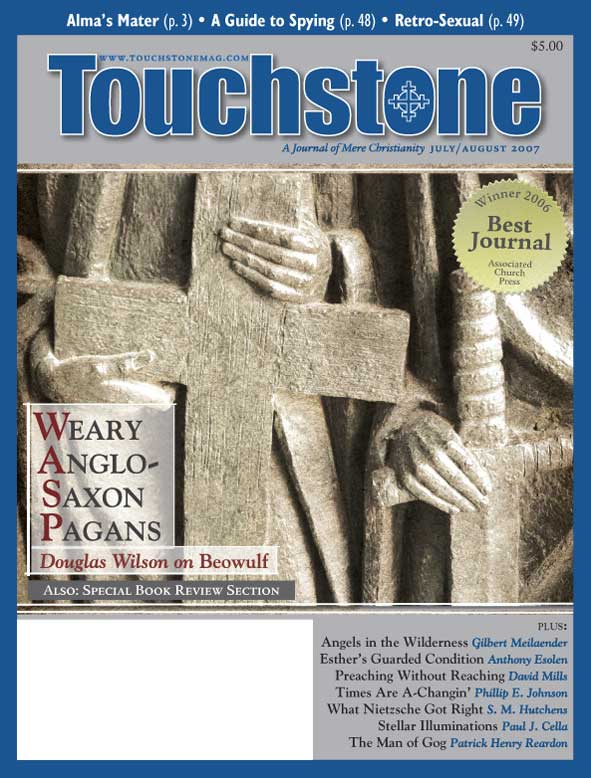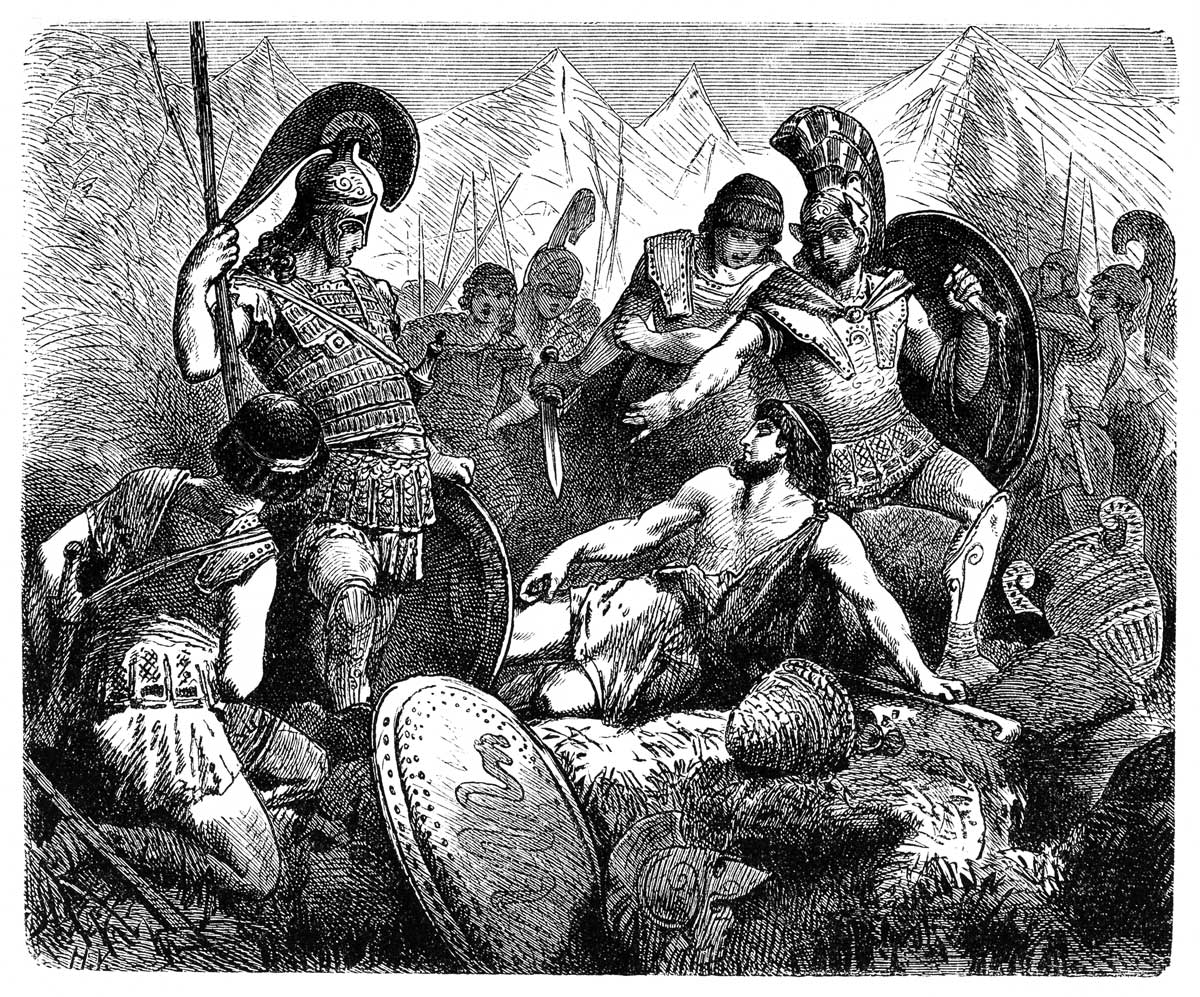Cosmic Grandeur
A Meaningful World: How the Arts and Sciences Reveal the Genius of Nature
by
Benjamin Wiker and Jonathan Witt
InterVarsity Press, 2006
(257 pages, $18.00, paperback)
reviewed by Jay W. Richards
One of the popular criticisms of the intelligent design movement is that it doesn’t produce anything new. Critics claim that advocates of design fixate on a few mysterious parts of nature that science hasn’t fully explained yet, rather than seeking to explain nature in its fullness. A Meaningful World sends this claim packing, and while doing so offers a compelling rebuttal to modern materialism and its reductionistic view of nature.
Benjamin Wiker lectures in theology and science at the Franciscan University of Steubenville. Jonathan Witt was for years a professor of English and is now a research fellow and colleague of mine at the Acton Institute (he was not a colleague when this review was commissioned). Both are also fellows of the Discovery Institute, the institutional home of the intelligent design movement.
Design Genius
As a team, they bring together knowledge of fields as diverse as chemistry and modern literary criticism. This allows them to extend the reach of contemporary design arguments, which have been limited mostly to the machine-like characteristics of nature, which point to a generic intelligence. They draw not just on the minimal definition of intelligence—the ability to choose between competing alternatives for some purpose—but on a sophisticated analysis of the elements of genius.
They begin by focusing on the works of one literary genius, William Shakespeare, especially Hamlet and The Tempest. Shakespeare knew when to conform to the rules of grammar and meaning and meter, but he also knew just when to break them in service of higher rules that befuddle the pedant. His work consistently displays not just technical excellence and intelligence, but what Wiker and Witt identify as the elements of genius: depth, clarity, harmony, and elegance.
First, there is depth: Shakespeare’s works have layers of meanings that one can spend a lifetime descending, without ever reaching the bottom. The reader senses that he is discovering new meanings in Shakespeare, not imposing them on the text.
At the same time, his works exhibit clarity. His plays were accessible to the illiterate masses in Elizabethan England, and are still accessible to modern readers who are willing to concentrate. But clarity is more than simply precision.
Wiker and Witt illustrate this point by comparing Miranda’s speech in The Tempest with a pedantic paraphrase. First Shakespeare: “If by your art, my dearest father, you have/ Put the wild waters in this roar, allay them.”
Now the translation: “If you caused this storm, father, stop it!” It may be hard to describe the difference between these two, but we recognize genius in the former but not the latter.
The third element of genius is the ability to bring together disparate elements in a unifying architecture or harmony, like the various instruments that contribute to Beethoven’s Fifth Symphony or the anatomy of an eagle in flight. Think of Shakespeare’s accomplishment in bringing together the comic and the tragic in Hamlet.
Finally, there is elegance: “With harmony, the emphasis is on the relationship among the parts, a diversity brought into happy association,” they explain. “Elegance emphasizes the unity in diversity,” like the expression of matter’s relationship to energy in e=mc2.
Nature’s Genius
Wiker and Witt then turn to the book of nature: geometry, chemistry, astronomy, cosmology, physics, and finally life itself. Everywhere, they uncover the elements of genius that the reader has learned to recognize in Shakespeare.
They show that something as seemingly dismal as the periodic table of elements is not merely a human attempt to make sense of chemistry. It describes a reality that, in its own peculiar way, has the marks of genius.
The early search for the elements might have seemed like blind stumbling in the dark. But early chemists had an abiding faith in an underlying order, which was eventually rewarded as individual elements began to fit into an elegant and harmonious pattern.
The order also shows depth, since each new insight served as a stepping-stone to the next, as if laid out as a brilliant tutorial for beginning chemists. For instance, the “law of octaves,” describing the fact that every eighth element has similar properties, inspired Mendeleev to insist on the existence of certain undiscovered elements. That led him and others to search for and find the mystery elements. That in turn gave Niels Bohr enough information to discern an elegant order at the subatomic realm, and later, at the quantum realm.
What if a guiding elegance were only visible at the deeper levels? Chemistry might have been clouded in mystery forever. Materialism provides no reason to expect the chemical world to be accessible to human investigation, let alone to provide signposts and bridges for the investigators. That type of depth suggests foresight, purpose, and genius.
Materialism’s Counterclaim
We know the counterclaim. In his book on the origins of the universe, The First Three Minutes, Nobel Prize-winning physicist Steven Weinberg argued: “The more the universe seems comprehensible, the more it also seems pointless.” Wiker and Witt show that this is not a conclusion derived from studying the natural world in all its depth, but from the materialist’s peculiarly reductionistic way of viewing the world.
Reductionism has its uses, of course. Sometimes we gain precision by abstracting out most of the details of the reality we are studying. We don’t need to know the colors of Jupiter’s stripes to be able to predict where the planet will be on June 10, 2009.
The reductionist’s mistake is in confusing a useful but extremely narrow way of viewing the world with the world itself. Otherwise, Weinberg would see that the fact that the universe is comprehensible is evidence that it is not meaningless but meaningful.
The effect of Wiker and Witt’s full argument is a great reversal of the materialist creed, which sees nature as ultimately meaningless. Suddenly we recognize wholes as greater than the sum of their parts. We see a world not flat and meaningless but bulging with meaning, a world “charged,” as Gerard Manley Hopkins put it, “with the grandeur of God.”
The materialism we’ve been fed with our mother’s milk begins to look more and more like intellectual and spiritual blindness, if not simply a mass delusion. The professional critics of intelligent design didn’t see this book coming, and are unlikely to have a ready response to its argument.
Jay W. Richards is vice president and senior fellow of the Discovery Institute in Seattle. He is the author most recently of The Untamed God (InterVarsity, 2003) and co-author with astronomer Guillermo Gonzalez of The Privileged Planet: How Our Place in the Cosmos Is Designed for Discovery (Regnery, 2004).
bulk subscriptions
Order Touchstone subscriptions in bulk and save $10 per sub! Each subscription includes 6 issues of Touchstone plus full online access to touchstonemag.com—including archives, videos, and pdf downloads of recent issues for only $29.95 each! Great for churches or study groups.
Transactions will be processed on a secure server.
more on science from the online archives
more from the online archives
calling all readers
Please Donate
"There are magazines worth reading but few worth saving . . . Touchstone is just such a magazine."
—Alice von Hildebrand
"Here we do not concede one square millimeter of territory to falsehood, folly, contemporary sentimentality, or fashion. We speak the truth, and let God be our judge. . . . Touchstone is the one committedly Christian conservative journal."
—Anthony Esolen, Touchstone senior editor













